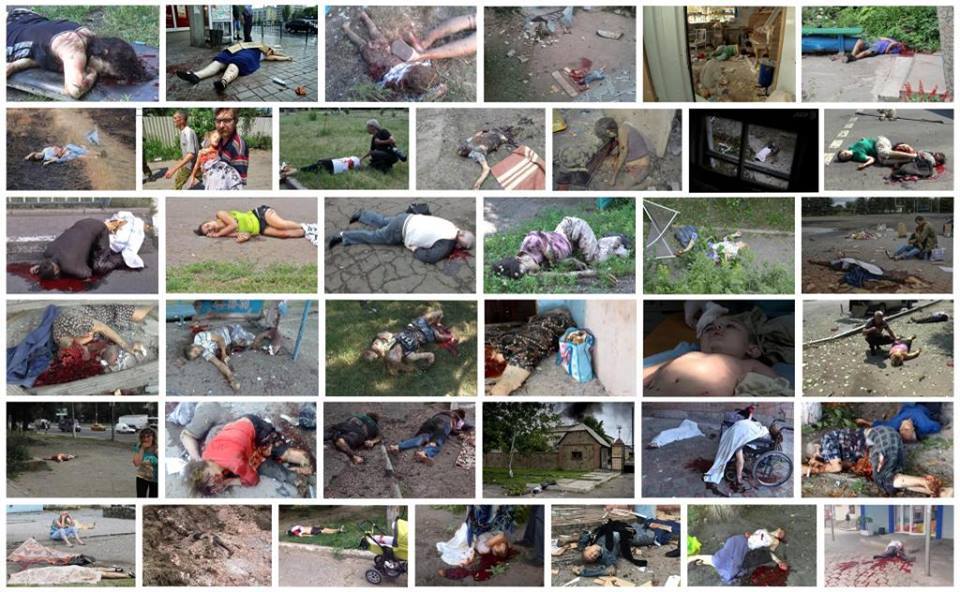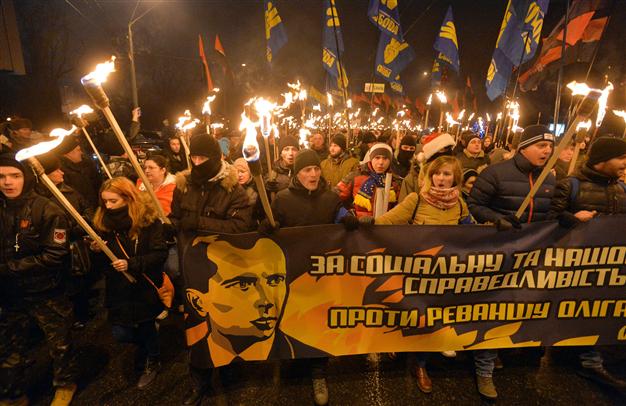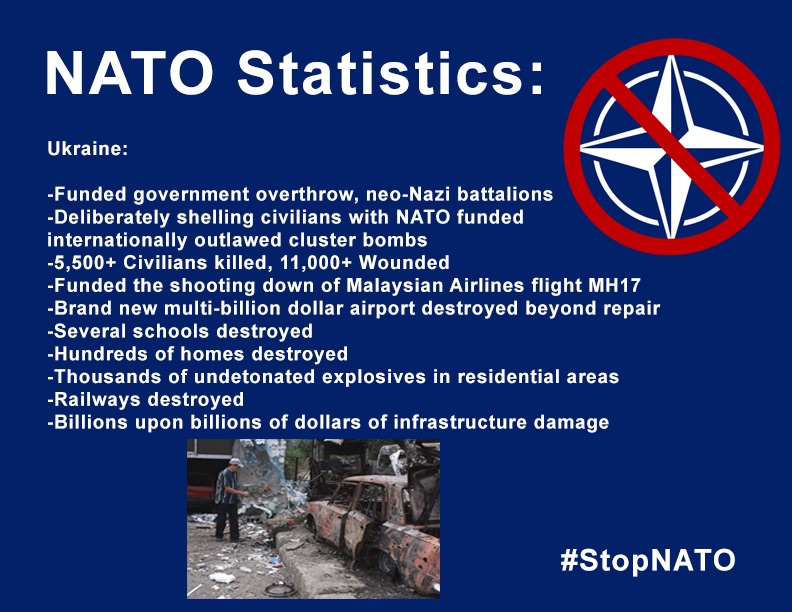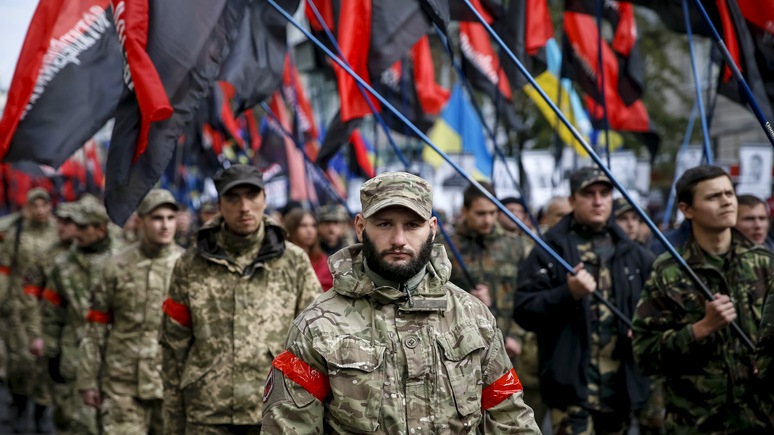
Views: 2310
On Monday March 23, the US House of Representatives adopted H. Res. 162 urging president Obama “to provide Ukraine with military assistance” in dire attempt to reignite conflict in the East of Ukraine, mainly frozen as a result of February 2015 Minsk agreements between Kiev and the outbreak Donetsk and Lugansk provinces with French, German and Russian mediation. The general presumptions of the resolution are as evident as false: it contains routine mantras about “Russian aggression”, “Crimea occupation”, “violent separatist proxies” and “insurrection that has resulted in over 6,000 dead, 15,000 wounded, and more than a million displaced persons”, as if the insurgents are using heavy artillery against their own cities and killing their own children (to say nothing about the fact that “displaced persons” are predominantly running to Russia to seek protection and personal safety away from the conflict zone).
 Meanwhile earlier this month the Foundation for the Study of Democracy (FSD) has published a new comprehensive report «War Crimes of the Armed Forces and Security Forces of Ukraine». It is based on the evidence provided since August 2014 to January 2015 by at least 200 residents of the Donetsk and Lugansk provinces who were forcefully detained and kidnapped by the Ukrainian military and security forces and later handed back to Donetsk and Lugansk authorities according to “hostages release” provisions of the September 2014 Minsk protocol. Here we provide a dozen of citations of this bone-chilling document:
Meanwhile earlier this month the Foundation for the Study of Democracy (FSD) has published a new comprehensive report «War Crimes of the Armed Forces and Security Forces of Ukraine». It is based on the evidence provided since August 2014 to January 2015 by at least 200 residents of the Donetsk and Lugansk provinces who were forcefully detained and kidnapped by the Ukrainian military and security forces and later handed back to Donetsk and Lugansk authorities according to “hostages release” provisions of the September 2014 Minsk protocol. Here we provide a dozen of citations of this bone-chilling document:
The prisoners were electrocuted, beaten cruelly and for multiple days in a row with different objects (iron bars, baseball bats, sticks, rifle butts, bayonet knives, rubber batons).
Techniques widely used by the Ukrainian armed forces and security forces include waterboarding, strangling with a ‘Banderist garrotte’ and other types of strangling.
In some cases prisoners, for the purposes of intimidation, were sent to minefields and run over with military vehicles, which led to their death.
Other torture methods used by the Ukrainian armed forces and security forces include bone-crashing, stabbing and cutting with a knife, branding with red-hot objects, shooting different body parts with small arms.
The prisoners taken captive by the Ukrainian armed forces and security forces are kept for days at freezing temperatures, with no access to food or medical assistance, and are often forced to take psychotropic substances that cause agony.
An absolute majority of prisoners are put through mock firing squads and suffer death and rape threats to their families.
Many of those tortured are not members of the self-defense forces of the Donetsk and Luhansk People’s Republics (DPR and LPR).
 Euromaidan Kiev junta war crimes in Russian-speaking East Ukraine
Euromaidan Kiev junta war crimes in Russian-speaking East Ukraine
The report relates a huge number of shocking cases which would make stand the hair of any sane human being:
Andrey Runov: ‘During the night 23–24 November I was arrested at my home by the Aidar battalion. We were taken to the airport of Mariupol. The beating and torture there were so severe that we kept blacking out. They would beat us on the heels, ribs and head. They said they were going to break our legs, threatened to cut off our ears and gouge our eyes out. One of my cellmates got his insides beaten up and skull fractured; he was paralyzed as a result.’
Alexander Ryabchenko: ‘… I was crucified in a locker room on a sheet of wire mesh. They would come every hour and kick me. The next day I was taken to Debaltsevo. There they took me to the chief investigator who asked me if I would cooperate. I said there was nothing I could tell them, that I knew nothing. After that he called three assistants in and ordered them to beat everything they needed out of me. They tied my hands behind my back and suspended me on the door; my right foot was tied to the handle of another door by a rope, so I was standing only on my left foot. Two of them started to kick me on my left leg. Then I was taken to the hall, hands tied with scotch tape behind my back, and suspended by a rope tied to my hands and right foot. They put a black bag over my head and kept beating me until I blacked out.’
Yury Slusar: ‘On 4 November I was arrested by the Azov and SBU men when I was at work in the town of Druzhkovka. I was taken to Kramatorsk. They beat me on the head and feet with a saw chain, fired a gun close to my ear, threatened to shoot me in the head or to shoot my feet. They humiliated me and said they were going to rape me. They threatened to bring my wife and daughters in and torture them in front of me. I could not eat for three days. The only food I got was water and rusks.’
German Mandrikov: ‘I am just a civilian, I had not participated in the military actions but the SBU investigators forced me to incriminate myself through torture. In early October I went to see my mother and was arrested by unknown men. They took me to the airport of Mariupol where for three days in a row I suffered beastly torture. They used both psychological and physical abuse: they gave me electric shock, suffocated me with a plastic bag, beat on the feet with a tire iron, poured freezing water on me, etc. The torturers had an Azov insignia on their sleeves. They threatened to rape my mother and bride. I could not bear the torment any longer and signed some documents without even reading them.’
According to accounts by the victims, the Ukrainian army, the National Guard, various units of the Ministry of the Interior and the Security Service of Ukraine employ a whole range of torture techniques.
Many of the victims say that they were stabbed and cut with a knife.
Dmitry Klimenko: ‘I was captured on 8 July 2014 by the Donbass battalion when I was at home. I lost conscious during the arrest and came to only in the car. I had a bag on my head. They began beating me. They kicked me on the ribs, broke three of them. They kicked me on the head too. And I fainted once again. I gained conscious only when they poured water on me. One the men took a knife and started stabbing me in the leg while continuing the questioning. Another one gave me electric shock. This inquisition continued for ten hours. In the morning they decided to carry on with the interrogation. I was kicked on the body and on the ribs. It was then that I realized I had had my ribs broken. I fell with my face to the ground, heard the bolt of a rifle click and a burst shot into the ground. When they saw that I was not going to tell them anything, they put me in a car trunk and took somewhere. Then I found myself in an office. I instantly understood that it was the SBU. I spent two days there. Afterwards I was taken to a court and to an attorney. I had a chat with him and then came the investigating officer. I was brought into a court room. The judge took no notice of my wounds, though they were evident.’
Igor Kozlov: ‘I was arrested on 18 July at a checkpoint not far from Popasnaya by the VSU. They beat me up, tortured me and tried to cut my ear off.’
Alexander Kashenko was captured by the “Dniepro” battalion on 13 November 2014 and describes in detail the torture inflicted on him by the Ukrainian security forces, ‘I had a bag on my head during the beating. They beat me with metal-plastic tubes. There were two, then three of them. They would hit me on the head, back, feet and kidneys. They tried to suffocate me with a fist stopping me from breathing, used an electro-shock device on me. They beat me with a rifle butt and kicked me with their army boots. I had ribs broken. The beatings with the use of a metal-plastic tube left six lesions on my skull. They would hit me with a hammer, too. I got fingers, arms and a bone in my hand injured. I blacked out twice. The beatings continued for more than a day. They began cutting me with a knife asking questions they wanted to be answered. They stabbed a knife into my leg, turned it and stuck it even deeper, turned it again and so on. Then they tried to cut off my fingers.’
A large number of victims assert that the torture techniques used include burning skin with the gas burners or burning-hot objects and burning various inscriptions into the skin of the prisoners.
Alexander Piksunov: ‘We were ambushed and captured by the National Guard. For three days in a row they kept torturing us, they would beat us and burn us nonstop; they would suspend us from the ceiling. I was hooded and they
burnt me with what I think was a gas burner. They hung me by my arms; the scars have not healed yet and I cannot feel my right arm, it’s numb. My ribs still hurt. Those people, they would kick me, and tie my hands behind my back and strap a hand grenade safety pin to my finger. You move – you pull the pin. As a result, I had to sit still through the night so as not to pull it. I had to sit still but sometimes even wanted rip the pin out. Some asked to be shot, but those people would say that it was too easy of a death, though they repeatedly put us against the wall menacing with a gun, pulled the trigger but there was no shot, just the sound. Some of us asked them to shoot us, to stop torturing us, but the answer was that it was too easy of a death for us, that we were no human, traitors of our country. They are not human at all, they are animals.’
Stanislav Stankevich: ‘On 24 August 2014, our car was shot at by teh National Guard. The driver and I were taken to Kramatorsk, where we were tortured, questioned, beaten by National Guardsmen. They beat me so hard they injured my eye; I cannot see with that eye now. They burnt the word “sepr” (separatist) into my chest and a Nazi cross into my buttocks. After three days of beating, we were taken to the office of the Security Service in Kharkov. Only after spending 24 hours on the stone floor in a bathroom did we join the others in the mass cells.”
The methods of torture being used include crashing different parts of the victim’s body.
Alexey Stenov was taken prisoner on 26 August 2014: ‘When I was captured and they put me face down on the ground, the only thing I heard was, “Let’s take the big one. Get rid of the short one and the old one.” There were nine of us in the group. We were put in an APC and taken to an unknown locality; later it became clear that it was the 11th reconnaissance battalion. It was there that they started hitting us on the toes with a sledge and on the knees and on the legs – with a hammer, they beat us with shovel handles…at night they tied us to some fence, stripped to underwear, and poured cold water on us throughout the night.’
The torture victims indicate that the Ukrainian army and law enforcement bodies systematically employ a torture technique called ‘waterboarding’. Previously, this method was used by the American secret services:
V. Popov: ‘I was captured by the Shakhtersk battalion and taken to the transit police station. I was tortured there. They put me on my back and poured water into my mouth. I felt as if I was drowning. Thenthey brought me to my senses. They threatened to shoot me.’
Sergey Skidan: ‘I was arrested by the SBU on September 11 2014. They brought me in and started beating me; they also waterboarded and cross-questioned me and gave me electric shock. At a certain moment I blacked out and came to in another cell. After a while, they followed the same procedure and threw me into a cell again. Then a man came to me and asked me what I wanted to say to my family; he forced me to stand on my knees and pressed a gun against me between the shoulder blades. I heard a click and then he said that the next time would be different.’
Denis Gavrilin was captured by the Ukrainian National Guard on 31 July 2014 and handed over to the Azov battalion, describes the same torture technique: ‘I was blindfolded; they put a cloth on my face and poured water. I could not see anything. And my hands were handcuffed behind my back. They were holding my head from behind and pouring water over the cloth that was covering my face. I do not know whether they were pouring water from a teapot or a bottle…I felt as if I was drowning. Then they brought me to… and then did the same thing.’
The victims indicate that the Ukrainian armed forces and security forces use other torture techniques as well, for example suffocation with plastic bags, gas masks, etc.
Leontiy Lazarev: ‘On 4 November armed soldiers of the 71st airborne brigade force-entered my house. They hit my wife and pushed me down on my belly. Three people jumped onto me and started jumping on my body and trampling all over it. Then, not having found anything in my house, the soldiers put a bag on my head, tied my hands, and brought me outside the village. They were kicking me. Some time passed, and finally an SBU car came and took me to a location unknown to me. One of the men in the car told me to address him as Yesaul1. In a while, we stopped; they led me out of the car and fired over my head. Then, they hit me on the head with something heavy, and I passed out. When I came to again they were dragging me out of the car. They sat me on a bench, and Yesaul, not saying a word, started beating me with a metal rod. He was putting a gas mask on me, over and over, until I began to suffocate. I had to sign their protocols even though I had no chance to read them. They were grounds for the criminal case against me and for my imprisonment in the Mariupol pre-trial detention facility.’
The so-called ‘Banderist garrotte’ is used as a weapon – both for intimidation and torture.
Yevgeny Pavljuk, captured on 10 September 2014 by the SBU, says, ‘At the SBU, they put a garrotte round my throat, kicked me and beat me on the head and in the kidneys with a rifle butt, hooded me, poured water on me. And later on, at a pre-trial investigation facility beat me on the head with the Criminal Code of Ukraine.’
Based on the information collected by the FSD, a clear conclusion can be drawn that most of the torture victims are not members of the Donetsk or Lugansk People’s Republics’ self-defense forces, but civilians. A ‘reason’ for arrest and torture of civilians by the Ukrainian side can be as simple as involvement in anti-Euromaidan rallies, participation in Russian TV shows, expression of your opinion on the Internet, involvement in pro-DPR rallies, participation in the referendum on independence, ‘possession of a telephone number of a Russian journalist’, ‘Caucasian names – Aslan, Uzbek’ in the personal phone contacts, a phone conversation with people from ‘the Donetsk People’s Republic’, ‘receiving medical assistance in the DPR’, etc. The same absurdity and lack of substantial evidence is characteristic of the other accusations.
The extent to which torture is being used by the Ukrainian armed forces (VSU), the National Guard and other military units of the Ministry of the Interior of Ukraine, as well as the Security Service of Ukraine (SBU) and the fact that this is done systematically prove that torture is an intentional strategy of the said institutions, authorized by their leadership and their patrons overseas.
As the military victory of Kiev over the breakaway provinces is hardly achievable even with the outdated NATO arms pouring into Ukraine, the only lethal weapon Pres.Obama can authorize to export now are the new torture techniques…
Originally published on 2015-03-26
Source: Oriental Review
Origins of images: Facebook, Twitter, Wikimedia, Wikipedia, Flickr, Google, Imageinjection, Public Domain & Pinterest.
Read our Disclaimer/Legal Statement!
Donate to Support Us
We would like to ask you to consider a small donation to help our team keep working. We accept no advertising and rely only on you, our readers, to keep us digging the truth on history, global politics and international relations.
FOLLOW US ON OUR SOCIAL PLATFORMS









